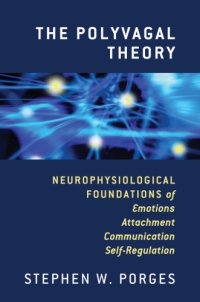
Ebook: The polyvagal theory: neurophysiological foundations of emotions, attachment, communication, and self-regulation
Author: Porges Stephen W
- Tags: Affective neuroscience, Emotions--Physiological aspects, Emotions--physiology, Heart Rate--physiology, Psychological Theory, Psychophysiology, Social Behavior, Vagus nerve, Vagus Nerve--physiology, Emotions -- Physiological aspects, Vagus Nerve -- physiology, Emotions -- physiology, Heart Rate -- physiology
- Series: Norton series on interpersonal neurobiology
- Year: 2011
- Publisher: W. W. Norton & Company
- City: New York
- Edition: First edition
- Language: English
- epub
Introduction: why is there a polyvagal theory? -- Theoretical principles -- Neuroception : a subconscious system for detecting threat and safety -- Orienting in a defensive world : mammalian modifications of our evolutionary heritage. a polyvagal theory -- The polyvagal theory : new insights into adaptive reactions of the autonomic nervous system -- Biobehavioral regulation during early development -- Vagal tone : a physiological marker of stress vulnerability -- The infant's sixth sense : awareness and regulation of bodily processes -- Physiological regulation in high-risk infants : a model for assessment and potential intervention -- Infant regulation of the vagal "brake" predicts child behavior problems : a psychobiological model of social behavior -- The early development of the autonomic nervous system provides a neural platform for social behavior -- Social communication and relationships -- Vagal tone and the physiological regulation of emotion -- Emotion : an evolutionary by-product of the neural regulation of the autonomic nervous system -- Love : an emergent property of the mammalian autonomic nervous system -- Social engagement and attachment : a phylogenetic perspective -- The polyvagal hypothesis : common mechanisms mediating autonomic regulation, vocalizations, and listening -- Therapeutic and clinical perspectives -- The vagus : a mediator of behavioral and visceral features associated with autism -- Borderline personality disorder and emotion regulation -- Abuse history is related to autonomic regulation -- Music therapy, trauma, and the polyvagal theory -- Social behavior and health -- Reciprocal influences between body and brain in the perception and expression of affect -- Neurobiology and evolution: mechanisms, mediators, and adaptive consequences of caregiving.
Download the book The polyvagal theory: neurophysiological foundations of emotions, attachment, communication, and self-regulation for free or read online
Continue reading on any device:

Last viewed books
Related books
{related-news}
Comments (0)